5月29日,南非將舉行種族隔離制度結束以來的第七次大選,此前推動南非人民解放的「非洲人國民大會」(ANC,以下簡稱「非國大」)長期以壓倒性優勢勝選,但在今年的大選中,「非國大」預計將面臨嚴峻的挑戰。近日,大多數民調預測,「非國大」得票率將首次低於50%;曾任「非國大」南非總統的雅各布·祖馬(Jacob Zuma)也選擇支持「民族之矛」黨派,與「非國大」競爭,給選舉帶來更多變數。
而在國際舞台上,作為全球南方國家的重要一員,南非也頗受關註。當地時間5月23日,海牙國際法庭就南非針對以色列的「種族滅絕」訴訟 做出了最新判決 ,要求以色列立即停止拉法攻勢。盡管以色列政府24日發表聲明反對南非和國際法院的做法,南非政府則表示國際法院的裁決「是重大突破」,將推動聯合國安理會開展討論,表示以色列必須遵守該裁決。
近日,在北京對話與聯合國南方中心聯合舉辦的「金磚國家貨幣和金融體系改革」對話會期間,參會的南非大使謝勝文與觀察者網進行了一場對話,就中南關系的現狀與發展前景,金磚合作成果,南非在巴以沖突的立場以及南非大選進行了深入討論。
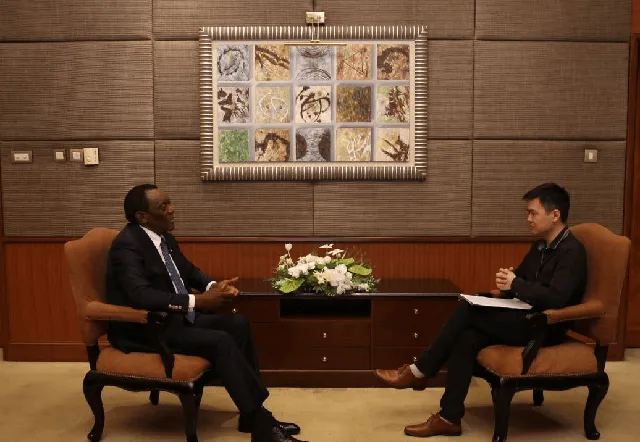
觀察者網對話謝勝文(圖源:北京對話)
中南兩國關系進入到更高水平
觀察者網: 您如何看待中國與南非關系的現狀與發展前景?
謝勝文: 非常感謝。我非常榮幸能擔任南非駐中華人民共和國大使,中南兩國的關系是與我年輕的國家一同發展的。我們兩國於1998年在南非人民獲得自由後才建立外交關系,在這之前納爾遜·曼德拉剛當選總統,南非的種族隔離政策剛結束,我們隨即承認中華人民共和國是中國人民的唯一合法政府,並結束了與台灣的關系。1998年前南非在台灣和香港設有外交機構,而香港在當時已經回歸中國了。
實際上,在兩國建立外交關系前,我們的政治關系早已建立。在南非反對殖民主義和種族隔離的鬥爭中,中國在最困難的時期給予了我們支持。20世紀50年代,曼德拉的朋友華特·西蘇魯(Walter Sisulu)被派來到這裏會見中國領導人,請求中國支持南方人民爭取自由的鬥爭,毛主席等中國領導層毫不猶豫地同意並提供了支持。60年代初,南非的一些自由戰士還在中國軍事學院接受了培訓。

1977年,中國人民解放軍南京軍區軍政幹部學校的南非等地學員
因此,這是長期建立的信任關系,政治互信對於兩國關系是非常重要的。現在,在習近平主席和西里耳·拉馬福薩總統的領導下,我們正在將雙邊關系提升到更高的水平。
習近平主席去年對南非成功進行了國事存取,將兩國關系提升到了更高的水平。首先,我們將南非的經濟重建與復興計劃與中國的「一帶一路」倡議結合起來,因為這些倡議是互通的。兩國元首還將我們的政治互信關系形容為兄弟和同誌之間的關系,這表明我們的領導人和我們的政治組織之間有著高度互信。因此,我們的政治關系是牢固的。
我們的經濟關系正在加強,我們現在也在重視民間交流。舉個經濟方面的例子,當我們於1998年1月1日建交並在北京開設使館時,南非和中國之間的貿易額約為10億美元;25年間,這一數額增長到了560多億美元。從10億美元到560億美元,這是個巨大的增幅。
在投資方面也是如此,南非公司在中國投資,中國公司也在南非投資,我們的投資是互惠互利、相輔相成的。自2009年以來,中國一直是南非最大的貿易夥伴;自2010年以來,南非一直是中國在非洲大陸最大的貿易夥伴,這表明了我們之間經濟關系的實力。
去年,中國貿易部長王文濤和南非貿工部長帕特爾舉行了會晤,今年3月他們又在北京舉行了會晤。為了平衡兩國貿易,中國同意從南非進口更多高附加值產品,兩國政府和國家元首在這個問題上達成了一致。我們非常高興的是,去年南非副總統馬沙蒂萊在北京與中國國家副主席韓正會面,討論中南國家雙邊委員會的工作,評估我們的工作進展。馬沙蒂萊還參觀了上海世博會,大約有四十家南非公司在上海世博會上展示了他們的高附加值產品。日後,我們將繼續這項工作。
現在,我們兩國之間的關鍵是在新數位經濟、經濟現代化以及應對氣候變遷等全球挑戰方面相互幫助合作。可喜的是,我們在這方面的工作進展非常順利。
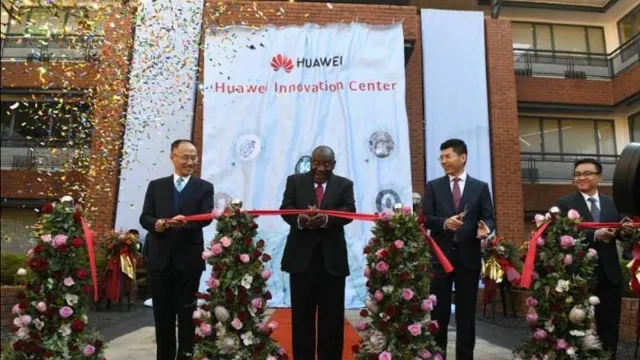
2023年7月13日,拉馬福薩出席華為南非創新中心剪彩儀式(圖源:華為)
因此,中南兩國關系的各個方面都在不斷加強,包括有許多南非學生在中國學習。兩國在衛生、科技領域的合作也在不斷加強,南非是新冠疫情後中國開放出境團隊遊的首批國家之一,南非總統將促進中國遊客來南非旅遊列為頭等大事。因此,中南兩國政府、公司和人民之間未來只會有更多的雙贏合作。這就是我們每天為推動雙邊關系所做的事情,我們從未停下步伐,將繼續把這種關系推向更高的水平。正因如此,即使在非洲大陸其他國家,我們也能一同開展聯合計畫,協助非洲一體化和推動非洲和平事業。我們正在與中國合作,中國國家主席習近平胡南非拉馬福薩總統在南非金磚國家峰會期間會見了非洲國家領導人,詳細討論了這些問題。
阻礙非洲國家發展的關鍵因素之一是其農產品的準入,因為他們沒有科學家來認證其食品的安全性。去年11月,正如習近平主席所承諾的,中國在南方的海南省召開會議(觀察者網註:期間中方正式釋出了農業農村部落實【中國助力非洲農業現代化計劃】務實合作舉措(2024-2026)、中非農業科技創新聯盟倡議、多年生稻創制及套用等三項成果),這表明中國領導人說到做到,他們不會只給出虛假的承諾。因此,我們可以看到,在經濟、人文以及政治等各個領域,兩國關系正變得越來越緊密。
金磚國家體系不同於以往的國際體系
觀察者網: 金磚國家無疑是這一關系的關鍵要素之一。今年,全世界關註的焦點是俄羅斯的金磚峰會。那麽,您認為俄羅斯將如何繼承去年南非金磚峰會的精神?您本人在其中做了什麽樣的工作?
謝勝文: 去年,我們排除萬難,成功舉辦了金磚國家峰會;當時有些人認為金磚五國會土崩瓦解,或者無法舉行會議,畢竟這是新冠疫情後金磚五國領導人的首次會晤,且在俄羅斯受到制裁和俄羅斯總統受到外部壓力之後舉行的。但峰會成功了,因為金磚國家有共同的願景。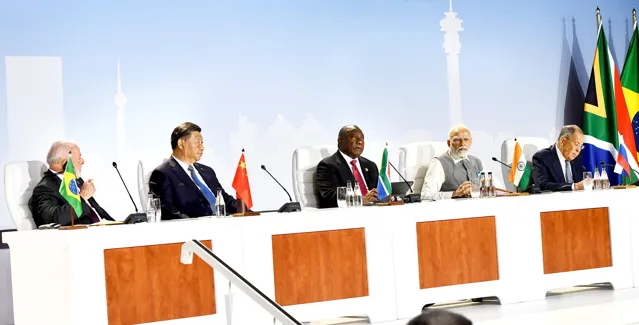
2023年南非金磚領導人峰會現場
我們雖然是不同的國家,有著不同的制度,但我們有著非常關鍵和重要的共識。我們認為,全球治理體系需要改革,以反映當前的現狀。我們還堅信,必須改革國際金融體系,以反映當前的貿易現狀,而不只是反映二戰後的狀況,因為80年間已經發生了很多變化。因此,盡管我們的體制不同,但這些共識將我們團結在一起。
作為金磚國家,我們不透過投票來做決定,而是透過協商一致來做決定。我們的領導人總會想方設法達成共識,大家可能認為這很耗時間,但在有政治互信的情況下,達成共識並不需要多少時間。舉個例子,去年全球南方開發中國家要求加入金磚國家的呼聲很大,但我們當時還沒有最終確定如何接納新的國家,沒有最終確定準入標準,因為我們不想分裂全球南方國家。
但我們的領導人達成了共識,然後邀請了六個國家,根據它們自己的願意可以在今年年初加入,畢竟加入的申請是它們自己提出的。這都是透過共識達成的,而在有政治互信的情況下,達成共識是很容易的,而人們總是很容易堅持自己所同意的事情。
我們不強調分歧,只強調能團結金磚國家的事情,而正是這一點給廣大開發中國家留下深刻印象,也是有這麽多國家申請加入的原因。去年有超過25個國家表示有興趣,我相信隨著今年輪值主席國來到俄羅斯,還會有更多國家表示有興趣。因為現實情況是,全球南方國家正面臨著各種挑戰,他們在金磚國家體系中看到了一些積極的因素。我們成立的金磚國家新開發銀行將有助於發展基建,當我們遇到像新冠疫情這樣的沖擊時,金磚國家都能夠從應急儲備中提取資金。開發中國家可以看到,我們正在利用自己的融資工具建設基礎設施,而這種融資工具並不像當前的國際金融體系那樣附帶如此巨大和限制性的條件。
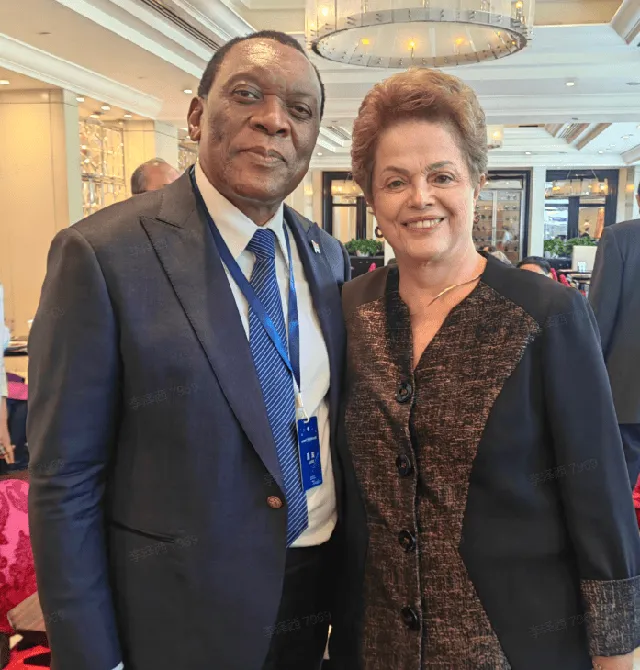
5月20日「金磚國家貨幣和金融體系改革」對話會期間,謝勝文與新開發銀行行長迪爾瑪·羅塞夫合影
正因如此,俄羅斯將國際貨幣和金融體系改革作為優先事項,以使其反映當前的現狀,我們對此表示支持。但是,我們認為這一切都必須透明,而且必須支持開發中國家的發展和貿易。這只是唯一的前提條件,但我們已經達成了普遍共識。有一個工作群組正在研究國際貨幣和金融體系改革,我們相信,他們將向我們的領導人送出一份可行的報告,然後將在今年的俄羅斯金磚首腦峰會上透過。
南非向國際法庭狀告以色列,不是因為宗教問題
觀察者網: 全球南方國家特別關註的另一件事是加薩沖突。南非已在海牙對以色列提起訴訟,指控他們施行種族滅絕。有些國家感到驚訝,此案是南非而非穆斯林國家主導推動的。南非為何采取如此堅決的立場?您對西方國家反對南非的立場有何看法?
謝勝文: 首先,我們沒有從宗教的視角看待加薩沖突,而是認為以色列的行徑是公然無視國際法。我們的態度非常明確,甚至在我們將以色列政府告上法庭之前,我們就已經與以方進行了交涉。我們告訴以方,我們認為你們的所作所為是在實施種族滅絕;我們反對哈馬斯的所作所為,即攻擊你們的公民、劫持人質以及殺人。
我們仍然堅信兩國方案,認為這是巴以彼此共存的最可行的解決方案。我們的原則是,反對濫殺無辜和集體懲罰。如果以色列想打擊哈馬斯,就不要去殺害無辜平民,不要殺害兒童和婦女,不要毀醫院,不要摧毀支持巴勒史坦人民的經濟基礎設施。這對我們來說一直是個原則問題,我們認為,對以色列這樣一個經歷過種族滅絕歷史的國家說,他們應該對此更加敏感。
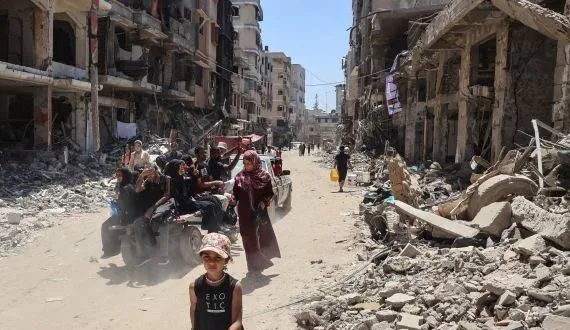
加薩走廊的巴勒史坦難民(圖源:半島電視台)
我們做出這一決定是出於原則,我們將繼續站在弱者一邊。我們知道這個決定不會得到某些大國的支持。但對我們來說,如果我們必須為此承擔後果,那我們願意坦然承擔後果。但我們不能保持沈默,因為我們知道被攻擊的痛苦。要知道,即使聯合國也花了相當長的時間才將種族隔離定義為反人類罪。但是,正是透過全世界所有熱愛和平的人們的共同努力,才將種族隔離定義為反人類罪。這樣一來,他們就可以成功動員國際社會的支持。
所以,我們在這方面是有經驗的。以色列不分青紅皂白地殺害巴勒史坦人民,只因哈馬斯襲擊了你們的一些基地,這就是反人類罪,因為以色列在試圖消滅這些巴勒史坦人民,消滅任何生活在加薩走廊的巴勒史坦人。這是不對的。這就是我們的立場。
但他們沒有將我們的看法聽進去。對我們來說,國際團結問題是我們建立當前民主制度的基石原則。曼德拉曾說,只要巴勒史坦人民沒有獲得自由,我們的自由就不完整,因為我們知道被壓迫的滋味。如果你是壓迫者,就很容易忘記壓迫別人的經歷。但如果你是受壓迫者,就很難忘記。我們甚至可以原諒那些壓迫我們的人,但我們會挺身而出,反對種族主義的邪惡面目,反對公然踐踏受國際法保障的人權。是的,我們確實收到了某些大國對我們貿易的威脅(觀察者網註:美國議員等人曾多次威脅,取消南非因美國【非洲增長和機會法案】而享有的免關稅優惠待遇),我們已經計算過損失,但我們告訴他們,如果你們要來欺負我們,威脅說要撤銷與我們的貿易,那你們就動手吧。我們有過多年吃苦的經歷,我們會找到辦法的。幸運的是,他們沒有采取這一步,但應該停止這種霸道的做法。
我們很高興國際社會發出了巨大的呼聲:解決沖突的唯一途徑是對話。應該停止對加薩人民的狂轟濫炸,停止對無辜人民、兒童、婦女的殺戮,停止他們現在面臨的饑荒。這就是我們將此事送出國際法庭的原因。
我們很高興國際法庭在聽我們的聲音,我們仍在陳述立場。我們也很高興不僅是阿拉伯國家,越來越多的國家都看到了這一點,因為這不是宗教問題,而是關乎如何處理國際法的問題。以色列是這一國際法體系的一員,南非也是其中一員。這個體系規定,如果其中一員像以色列這麽做,各國有義務匯報,可以把他們告上法庭。
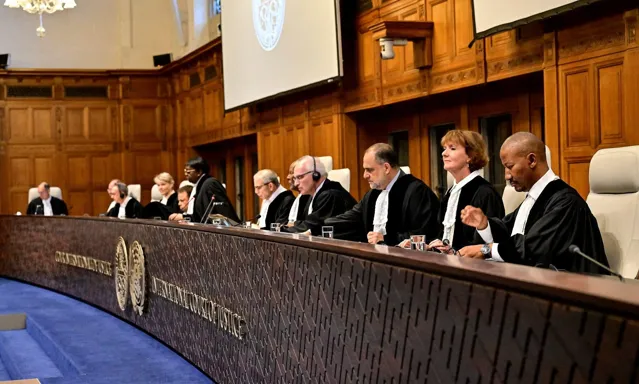
海牙國際法庭23日勒令以色列停止拉法攻勢(圖源:耶路撒冷時報)
現在我們面臨的挑戰是,在他們看來,我們是在攻擊以色列,但這實際上是為了維護聯合國體系。聯合國體系是我們在全球範圍內唯一可行的系統,我們不能讓它崩潰。第一個聯合國體系是「國際聯盟」(觀察者網註:一戰和二戰期間的聯合國前身機構,因重要國家的缺席,以及軸心國等國無視其規章制度侵略他國,未能避免戰爭,二戰期間崩潰),我們知道它是如何崩潰的:當大國保護他們的朋友,允許他們在他國為所欲為或施行種族滅絕時,就導致了上一個聯合國體系的崩潰。我們不會允許當前的聯合國體系崩潰。
南非超過342年的殖民歷史問題,不可能在30年內得到徹底解決
觀察者網: 就即將到來的南非大選,民調顯示,「非國大」的得票率很可能首次低於50%;與此同時,前總統祖馬則在跟非國大唱「對台戲」。您如何看待這次選舉,您認為國際社會應該如何看待這次選舉?
謝勝文: 南非已經建立了能夠支持民主制度的原則和機構,我們相信我們的法律體系和獨立選舉委員會將在5月29日順利舉行選舉,並實作和平過渡。我們所有的選舉都是和平的,盡管國際社會時常對此持有悲觀態度。上周末,我們剛剛在使館進行了投票,包括在北京、香港和上海。在過去三次選舉中,所有的預測都認為現執政黨的支持率將低於50%。幸運的是,這些民調之前都錯了,我不知道這是不是因為發起這些民調的人都對「非國大」持批判態度。我們這次仍然認為他們是錯的。但無論發生什麽,選舉結果都將由選民決定,選民們將在29日發出自己的聲音。
我們仍然相信會有政治延續性,因為「非國大」一直是南非穩定的支柱。國際社會,非洲兄弟都對此有擔憂。但我們向他們保證,我們所建立的制度是透明的,是足夠強大的,選民將做出他們的決定。
關於前總統祖馬的問題,他仍然是「非國大」的黨員,但目前黨員資格已被凍結。他支持另一個政黨(「民族之矛」)或領導另一個政黨對執政黨來說,並不是一件好事。但我認為「民族之矛」的支持率還沒有大到讓其扮演重要角色的程度,目前所謂的民意調查預測該黨支持率約為8%,我們不知道它到底會得到多少選票。
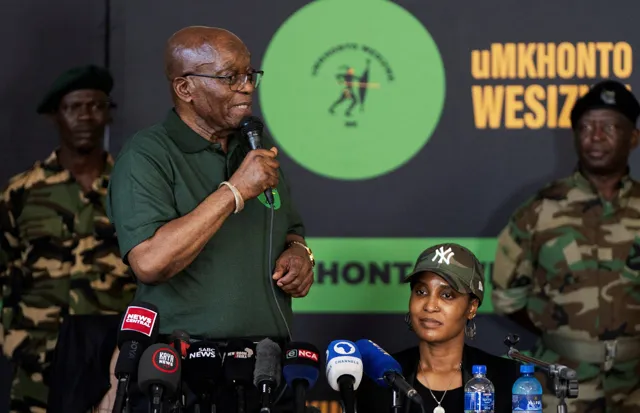
2023年12月16日,前總統祖馬出席「民族之矛」黨競選活動,宣布不再支持「非國大」(圖源:路透社)
但我們相信,「非國大」目前帶來的當前和長期穩定性以及競選宣言,會讓很多人相信,政治連續性是非常重要的,因為我們是一個年輕的國家。我們從來沒有認為,我們因超過342年的殖民主義、種族隔離而面臨的挑戰能在30年內得到徹底解決,但我們已經取得了進展。我們的政府提供了基本服務,將南非從一個分裂的國家轉變為一個團結的國家,這些都是在短短幾年內取得的重大成就。
我們相信,我們將繼續推進這些議程,甚至在選舉之後以更快的速度推進這些議程,這樣我們不僅在國內,還在國際上繼續發揮我們的作用,與像中國這樣的國家一同推動和平發展、和平共處以及各國之間的合作與團結。
以下為英文原文:
Guancha: How would you assess the present state and future potential of the China South Africa relationship?
Ambassador Cwele: Thank you very much. As the South African ambassador to the People's Republic of China, it’s really been a privilege for me, because our relations matches our young country. We only established the diplomatic relations in 1998 after our freedom. Because it's only after our freedom that President Nelson Mandela changed the apartheid policy and recognized People's Republic of China as the sole representative of Chinese people. So we move away from the relations with Taiwan. It was on Taiwan and Hong Kong, and then Hong Kong was reincorporated.
So when we established these relations, the fundamental thing was that our political relations were long established. China supported us during the most difficult part of our struggles against colonialism and Apartheid. In the 1950s, Nelson Mandela's friend Walter Sisulu came here, sent to meet the leadership of China, asking for support for struggle for freedom. And Chairman Mao and the leadership of China never hesitated to offer this support. They actually went on to train some of our freedom fighters on military colleges in the beginning of the 60s.
So that has been the long established relationships of trust, political trust is very important. Now under President Xi Jinping and President Cyril Ramaphosa, we are taking this relationship to even higher levels. What makes it even more, is that President Xi had a successful state visit last year, which took these relations to even higher level, where they said let's align our key programs for better implementation of our strategic comprehensive partnership. First, we align the South African economic and reconstruction and recovery program, as well as the Chinese Belt and Road Initiative, because these talk to each other. And thirdly, they described our relationship of political trust as a relationship of brothers and comrades, which show the high level of trust between our leaders and our leading political organization. So our political relations are solid.
Our economic relations are strengthening. And now we're focusing on people to people exchanges. Just to put the economic ones, for instance, into perspective, when we established the relations in 1998 on January 1st, opened the office in Beijing, the trade between South Africa and China was about 1 billion US dollars. In 25 years it grew to over 56 billion dollars. That's massive, from 1 to 56. And the investment part as well, South African companies are investing here, Chinese companies are also investing in South Africa. And there's a complementarity about this volume of investment. Now China is one of the large investment partners in South Africa. China has been the largest trading partner of South Africa since 2009. And South Africa is the largest trading partner from the African continent of China since 2010, which shows the strength of our economic ties and relations.However, last year, your trade minister Wang and my trade minister Patel met, and they met again this year in March in Beijing, where there is a common agreement that we have to balance our trade. In order to balance the trade we agree that we should bring more value added products from South Africa, there's agreement between our government and our president on this matter. And we're very happy that last year when our vice president met your vice president here in Beijing to do binational commission, assessing our progress of work, he also visited Shanghai Expo and we had about forty South African companies which just display their value added products in the Shanghai expo. And we continue this work. The key element, basically between us now is how do we work with each other to help each other in terms of new digital economy, modernization of our economy and also coping with global challenges like climate change. We are working very well on this.
So we can see growing strength in all aspects of our relations. We're very happy that there are many South African students who are studying in China. The cooperation on health, the cooperation on science and technology is getting stronger. We're very happy that South Africa is among the first countries where post covid China open for group tourism, because to us, Chinese tourists coming South Africa is a top priority of my president.So these are the things we only see that there will be more win-win cooperation between our people, our governments and our companies in this respect. And that's what we do on a daily basis to keep this relationship going, and we never get tired, we continue to take it higher to higher levels. And that's why we’re able, even on the continent, to agree to work on joint projects to assist the integration of Africa, the peace in Africa, we’re working with China. Your President Xi Jinping, and my President Ramaphosa met with African leaders at the sidelines of the BRICS summit in South Africa, where these matters were discussed in detail. In November last year, as President Xi promised, one of the key elements which was stifling the African countries was the access of their agriculture products, because they didn't have scientists to certify safety of their food. President Xi Jinping promised to offer training, called a meeting in Hainan province in the south in November, we show that what our leader say, it's done. They don't just give false promises. So we can see this relationship getting stronger and stronger from all elements, from economic, to people to people and the political.
Guancha: BRICS is definitely one of the key elements of the relationship. This year, what the world's attention is focused on is Russia's BRICS Summit. So how do you think it will inherit the message or the spirit of South Africa's BRICS Summit last year. And what has been your role in fostering this?Ambassador Cwele: Thank you very much. We had a very successful BRICS summit, against all odds last year. Some people thought the BRICS was going to collapse, not going to meet. It was a first meeting of leaders post covid. It happened just after the sanctioning of Russia and pressure on the Russian president. But the summit succeeded, because we got common vision as BRICS countries.
We are different countries, with different system, but what binds us is very key and very important. We believe that the global governance system needs to be reformed and represent the current reality. We also strongly believe that the international and global financial systems must be reformed to reflect the current realities of trade and not just post World War situation, because a lot has changed since then. So these are things, much as we've got different system, which bind us together. As BRICS, we don't take decision by voting, we take decisions by consensus. Our leaders always find ways to reach consensus. People think that this takes time; consensus doesn't take time when there's political trust. As an example, last year, we have not finalized how we will admit new countries, but there was so much pressure from developing south to join BRICS. And we have not finalized the criteria because one of the criteria is we should not divide countries of the Global South. But our leader they found consensus, and then invited six countries, that they can join at the beginning of this year if they wish, as they are countries that have applied. So it is through consensus and consensus can be reached easily when there's political trust, and you stick to the thing you agree upon.
We do not emphasize things which would create differences. We emphasize things where we unite as BRICS countries, and that's what has impressed most developing countries. That's why there are so many applicants, I want to join. Over 25 countries expressed interest last year, and I'm sure there will be more countries expressing interest as we go to Russia.Because the reality is that countries of the Global South are facing certain challenges, and they see some good elements within the BRICS system, they've seen that even the BRICS bank we formed, it helps us to develop our own infrastructure, it helps us with the contingency reserve when we have shocks like Covid, we're all able to draw from those contingency reserves as BRICS countries, and they can see the infrastructure we're building using our own financing instrument, which doesn't come with such huge and constraining conditionalities like the current international financial system. It is in this respect that the Russian Federation has prioritized international monetary and financial system reform to reflect the current realities. And we support them on this. However, we say that all this must be transparent and so that it must also support the development and trade of the developing countries. That's only proviso, but there's a general consensus. There's a task team which is working on this system. And we are confident that they will produce a workable report to our leaders to adopt at the Russian summit later this year.
Guancha: Something else that Global South countries have particularly paid great attention to is the war in Gaza. South Africa has filed a suit against Israel in the Hague, accusing them of genocide. This has surprised some countries that it's South Africa leading this and not a Muslim country. So why is South Africa taking such a strong stance? And what do you think of the western opposition to your stance?Ambassador Cwele: Firstly, we don't see the war in Gaza as a religious war. We see it as basically blatant ignoring of international law. And because we have been very clear, we have been engaging the Israeli government even before we took them to court. We told them that what you're doing, we think you're committing genocide. We don't agree with Hamas, what they did, attacking your citizen, taking hostage, or killing people. We still believe very strongly in the two state solution, and we think this is the most viable solution for you to live side by side with each other. And as a matter of principle, we are against indiscriminate or collective punishment. If you want to fight Hamas, you don't go and kill innocent civilians. You don't go kill children and women. You don't destroy hospitals. You don't go and destroy the economic infrastructure, which is supporting the people of Palestine. That has been the matter of principle to us. And we're saying to a country like Israel, which has a history of experiencing genocide, they should even more sensitive to this.
But we're not heard. To us, the issue of international solidarity is the principle under which our democracy was founded. To remember Nelson Mandela, he said we will never be free until people of Palestine are free, because we know what it’s like to be oppressed. If you’re an oppressor, it is easy to forget. But if you’re on the receiving end it’s difficult to forget. We can forgive even those who oppress us, but we would stand up to the evil head of racism, blatant abuse of human rights, which are guaranteed by international law, we will stand up.And we took this decision as a method of principle. And we'll continue to stand by the side of those who are weak, because we knew this decision was not gonna go well with some of the big powers for instance. But to us, we said, if we have to suffer the consequences, we will suffer those consequences. But you cannot keep quiet because we know the pain of being attacked. You know, it took time even for UN to define apartheid as a crime against humanity. But it was through united effort of all peace loving people in the world who describe apartheid as a crime against humanity. In that way, they could mobilize international support. So we've got experience on these things. Indiscriminate killing of the people of Palestine, just because Hamas has attacked some of your bases, it's a crime against humanity, because they are trying to eliminate these Palestinian people. They are trying to eliminate any Palestinian who live in that Gaza strip. That’s wrong. So that's what we stand for.
Yes, we did receive some threats from some of the big countries with our trade, we have calculated the losses, we told them, if you’re gonna come and bully us with the threat that you’ll withdraw your trade with us, you might as well do it. We know how to suffer, but we'll find a way. But luckily, they didn't go to such extent. But the bullying tactics and the bullying politics should stop. And we’re really happy that the international community is really making a huge call, that the only way to solve conflict is through dialogue. We should stop that indiscriminate bombing of the people of Gaza. We should stop the killing of innocent people, children, women, the famine they're facing now. That's why we took this to the international court. We are happy that they’re listening to us. We’re still pushing and presenting our case. We’re happy that more and more countries are seeing this, not only Arab, because it's not a religious thing, is a matter of how do we deal with international law. Israel is a member of this international law system. South Africa is a member. And that system says, if one of your member does this, you must report, you can take them to this court.
Now, the challenges is they see this thing as if we are attacking Israel, but it is also to protect our UN system, because that's the only viable system we have globally, the UN system. We cannot allow it to collapse. The first UN system is called league of nation, and we know how it collapsed: It is when big powers were protecting their friends and allowing them to do wrong things or genocide elsewhere, that it caused the previous UN system to collapse, and we're not gonna allow this current of UN system to collapse.
Guancha: On the upcoming South African elections. Polls show your party, ANC, is likely going to be fall below 50% for the first time, and your former President Zuma is playing a counter-productive role in this, from your party’s perspective. What do you think about this election and how do you think the international community should look at this?Ambassador Cwele: South Africa has established the principles and institutions that support our democratic system. And we are very confident on this, that these systems, both our legal system and Independent Electoral Commission, will conduct this election on the 29th of may and create a peaceful transition. All our elections have been peaceful despite the gloom the international community thought it was. We just voted this weekend at our embassies abroad, including here in Beijing, Hong Kong and Shanghai, they were always smooth and we believe the 29th will also be smooth.
On the issue of prediction, over the last three elections, all the predictions were that the current ruling party will go below 50%. And that has not happened, fortunately, all these polls, I don't know, because they're done by critical people, they were all wrong. We still believe they are wrong. But whatever happens, the outcomes of the elections are determined by the voters. It is the voters who gonna make their voice heard on the 29th. And we still believe that there will be some form of continuity, because ANC has been the anchor of stability in South Africa. It's not only a fear of international communities, a fear also of African brothers, because they also have this feeling. But we assure them that with the systems we’ve built, they're transparent, they're strong enough, and the voters will make their decisions.
On the issue of the former president, who is still a member of the ANC, but suspended at that moment, supporting another party or leading another party is not a good thing for the ruling party. But I don't think his support is so big that it may make him as a significant player. The current projected supported by so called polls is about 8%, but we don't know how much he will get. But we believe that the current stability brought by the leading party, and the projected stability, because look at the manifesto, it will convince many people that continuity is very important because we're a young country. We never thought that, with the challenges we face because of apartheid of over 342 years of colonialism will be eliminated just in 30 years, but we've made progress. We have delivered basic services as a government. We have transformed South Africa to be a united country from a divided country. Those are major achievements in just a few years, and we believe that we will continue with these projects, and at a greater pace even after elections, so that we continue to play our role, not only domestic but at the international level, where countries like China are pushing for peaceful development, peaceful coexistence and cooperation and solidarity among nations.











